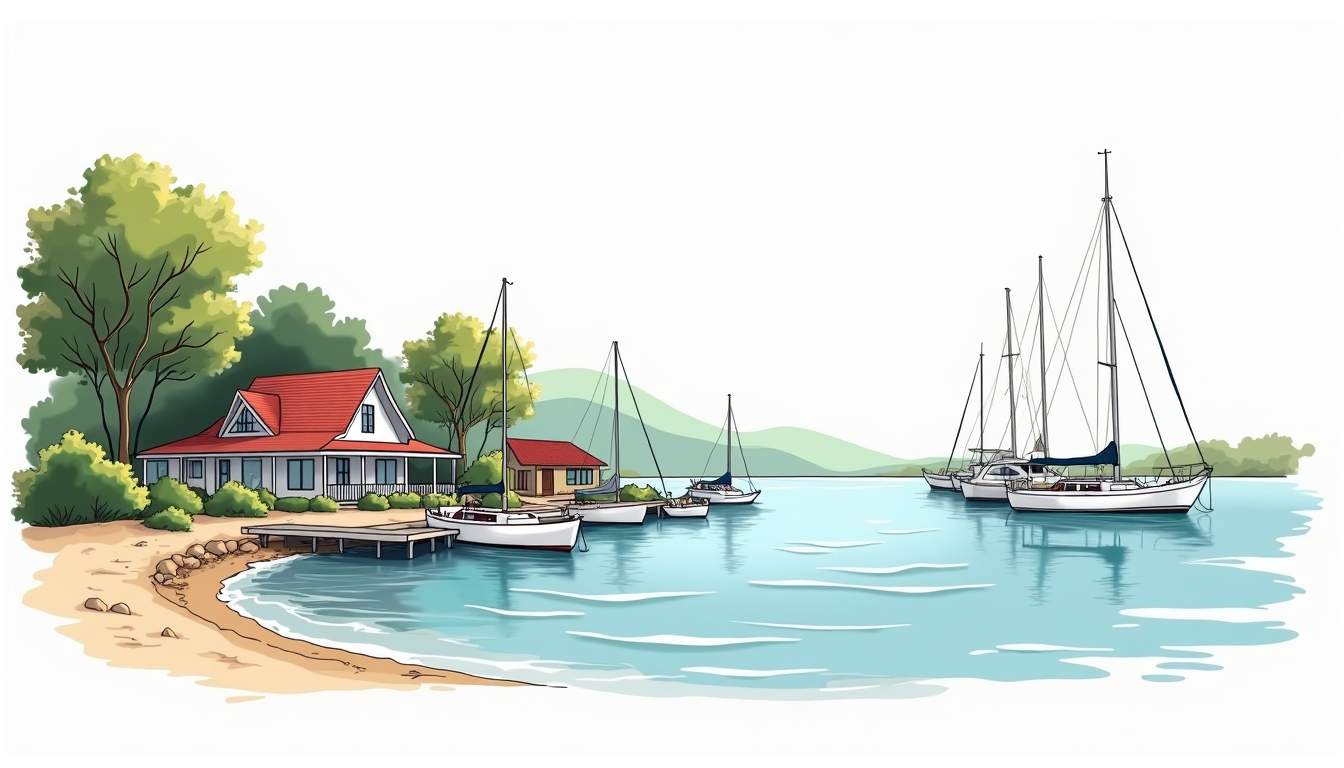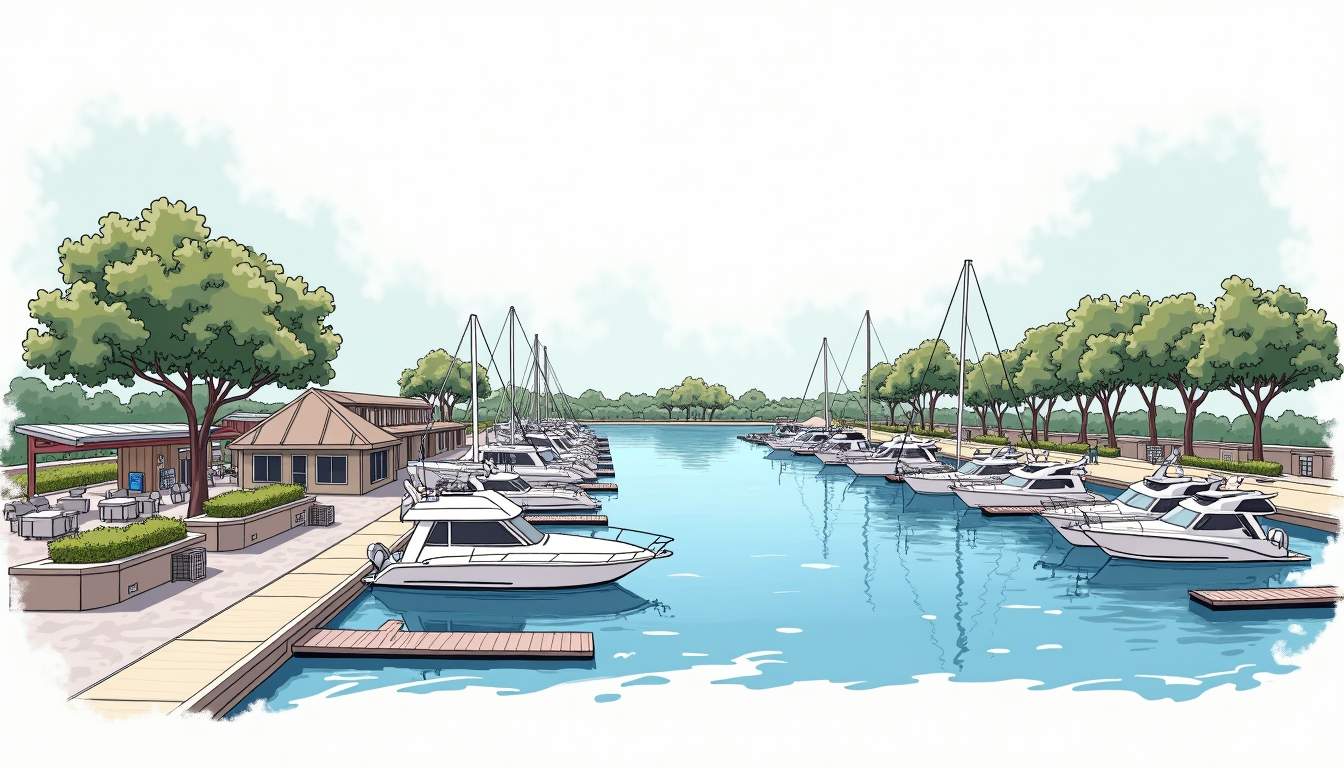
Buying a vacation home on marina property blends the pleasures of waterfront living with the responsibilities of property investment. This guide walks through the essential considerations, from choosing the right marina community and understanding ownership structures to financing, maintenance, rental potential, and lifestyle factors that influence long-term satisfaction and resale value.
Marina properties offer direct access to water-based recreation, scenic views, and a unique community atmosphere centered on boating, fishing, and coastal living. For many buyers, the appeal includes easy launching of boats, on-site amenities like docks and clubhouses, and the social opportunities of marina-side neighborhoods.
Beyond leisure, marina properties can serve as strong vacation rental investments when located in desirable boating regions. Proximity to marinas often attracts guests seeking active waterfront experiences, which may translate into higher nightly rates and occupancy compared with non-waterfront vacation homes.
Additionally, the convenience of having marine services nearby, including fuel docks, maintenance facilities, and boat storage options, can greatly enhance the day-to-day boating experience. This integration makes marina properties particularly appealing to avid boaters who value hassle-free access and comprehensive support for their vessels.
The architectural styles of marina properties often reflect the coastal environment, with design elements that maximize natural light, cross ventilation, and panoramic water views. Many of these homes incorporate large decks, balconies, and outdoor living spaces that encourage seamless indoor-outdoor interaction, perfect for entertaining or relaxing in a tranquil waterfront setting.
Access to boating slips, paddle sports, fishing, and waterfront dining shapes daily life. A marina property often supports an outdoor-oriented routine, with mornings on the water and evenings spent watching sunsets over the harbor. Community events and clubs geared toward maritime activities can enrich the social life of owners and guests alike.
Historically, waterfront real estate can hold value well, though local market dynamics matter. Properties attached to marinas may command premium prices and remain attractive for resale. When permitted, short-term rentals can create a steady income stream, but regulatory and seasonal factors will strongly influence returns.
Moreover, as climate change and environmental considerations become increasingly important, owners of marina properties may find themselves involved in local conservation efforts and sustainable boating practices. These initiatives not only protect the natural beauty that makes these communities special but can also enhance property desirability for environmentally conscious buyers and renters.
Investing in marina properties also requires awareness of potential maintenance costs related to saltwater exposure, such as corrosion, which can affect both the home structure and boating equipment. Prospective buyers often consider these factors carefully, balancing the unique lifestyle benefits with ongoing upkeep commitments.
Marina properties can be sold as fee-simple homes, condominium units, or leasehold arrangements. Understanding the legal structure is essential since it determines rights, responsibilities, and long-term costs.
Fee-simple ownership grants ownership of the land and structure, providing the most control. Condominiums typically include shared ownership of common areas and amenities with a condominium association governing rules and fees. Leasehold properties mean the land is leased from a marina owner or municipality for a set period, which can complicate financing and resale if lease terms are unfavorable.
Boat slip assignments and docking rights vary; some properties include a deeded slip, others offer a transferable lease or an on-demand reservation system. Clarify how slips are assigned, whether they can be sublet or transferred, and if there are waiting lists. Check marina covenants for vessel size limits, maintenance responsibilities, and rules about guest usage.
Local zoning and environmental regulations may restrict building changes, shoreline modifications, or dock expansions. Floodplain designations and local ordinances can influence insurance costs and required building standards. Insurance policies should account for flood, wind, and boat-related liabilities—obtain quotes before closing to avoid surprises.
Financing marina properties can be more complex than typical homes. Lenders assess collateral, marketability, and risk differently when water access or leasehold arrangements are involved. Understanding lender criteria early expedites the buying process.
Conventional mortgages are available for fee-simple and many condominium marina homes, but underwriting may require larger down payments or higher credit standards. For leasehold properties, some lenders hesitate or impose stricter terms. Specialized marine or VA loans might be options for qualified buyers. Prepare documentation showing association financials, marina lease terms, and slip ownership details.
Closing costs often include title insurance, survey fees, and, in marina contexts, possibly transfer fees for slip assignments. Ongoing expenses include homeowners association dues, marina maintenance fees, slip rental or ownership fees, and utilities. Budget for seasonal maintenance like winterizing boats and peak-season staffing at the marina.
Not all marinas are created equal. A well-managed marina enhances property value and owner experience, while a poorly run facility can lead to disputes, higher costs, and declining asset value. Careful on-site evaluation and conversations with current residents provide valuable insight.

Investigate the marina’s management company or homeowners association. Ask about staff presence, maintenance schedules for docks and pilings, dredging history, and capital improvement plans. A proactive management team with transparent budgeting typically signals healthier long-term prospects.
Amenities worth noting include private slips, fuel docks, pump-out stations, on-site maintenance services, dry storage, laundry facilities, fitness centers, and community gathering spaces. Some marinas offer charter or excursion services, which can enhance rental appeal. Evaluate which amenities match intended use—family-friendly pools or nightlife-adjacent options matter depending on target guests.
A water-adjacent inspection covers both the home and the marine infrastructure. Engage inspectors experienced with waterfront properties and docks to uncover problems that impact safety and long-term costs.

Home inspections should include foundation stability and moisture intrusion checks influenced by proximity to water. Dock inspections evaluate pile integrity, hardware corrosion, float condition, and safe access. If the property includes a boat lift, confirm its age, load capacity, and maintenance history.
Water quality impacts recreation and property desirability. Harmful algal blooms, siltation, or pollution incidents can reduce rental demand and enjoyment. Assess local water quality reports and marina dredging plans. Shoreline erosion and habitat conservation rules may also affect future improvements.
Vacation rental income can offset ownership costs, but regulations and neighborhood sentiment shape what’s feasible. A thorough understanding of local laws and HOA rules prevents legal pitfalls and community disputes.
Many municipalities and associations impose short-term rental licensing, occupancy limits, and tax collection responsibilities. Some marinas restrict rentals to owner-occupied use or require special insurance for short-term guests. Confirm whether rentals are allowed and what permits or registrations are required.
Successful marketing leverages the property’s marina access and unique experiences like sunrise cruises or fishing charters. Seasonal demand around boating holidays, summer months, and local events will influence pricing and occupancy. Analyze comparable listings and occupancy rates to forecast realistic income and set expectations for off-season downtime.
Daily life on marina property involves both rewards and responsibilities. A few practical habits and habits of maintenance keep the experience enjoyable and protect the investment.

Routine dock checks, corrosion control for metal components, regular boat lift servicing, and envelope sealing for the house reduce long-term repair needs. Preseason preparation often includes checking mooring lines, testing pumps, and ensuring storm plans are in place for severe weather.
Marina communities balance private enjoyment with shared spaces. Observing quiet hours, managing boat noise, and properly storing gear demonstrates respect for neighbors. Clear communication about guest behavior, dock usage, and parking preserves community relationships.
Even when purchasing for enjoyment, an exit strategy supports sound investment planning. Consider how marketability and resale value will be influenced by location, slip ownership, and community reputation.
Deeded slips, strong marina management, and high-quality construction tend to enhance resale value. Proximity to popular waterways, local attractions, and reliable infrastructure like dredging schedules are positive indicators. Upgrades that improve energy efficiency or flood resilience also attract buyers.
Risks include changing zoning laws, environmental events, and marina mismanagement. Mitigate by researching long-term marina plans, reviewing association meeting minutes, and purchasing adequate insurance. Diversifying use—combining owner use with managed rentals—can offset income volatility.
Before making an offer, run through a practical checklist to confirm the property meets needs and expectations.
Checklist highlights: confirm slip ownership or lease terms; review HOA and marina rules; request recent inspection reports for docks and lifts; obtain insurance quotes including flood and wind coverage; verify rental regulations and tax obligations; assess local market demand for vacation rentals; check dredging history and water access year-round.
Owning a vacation home on marina property combines the joy of waterfront living with specific legal, financial, and practical considerations. Careful due diligence—examining ownership structures, marina management, inspection findings, and rental regulations—creates a foundation for a satisfying ownership experience. With the right location, management, and preparation, a marina-property vacation home can offer both memorable leisure and solid investment potential.
Ready to embrace the luxury and lifestyle of a marina property in a premier gated community? Tennessee National offers exclusive waterfront living with private marina access, a Greg Norman Signature Golf Course, and over 20 exceptional amenities. Whether you prefer a move-in ready home or a custom build, experience unparalleled comfort and resort-style living nestled in Tennessee’s scenic beauty. Schedule a Private Tour today and take the first step toward making your dream marina vacation home a reality.